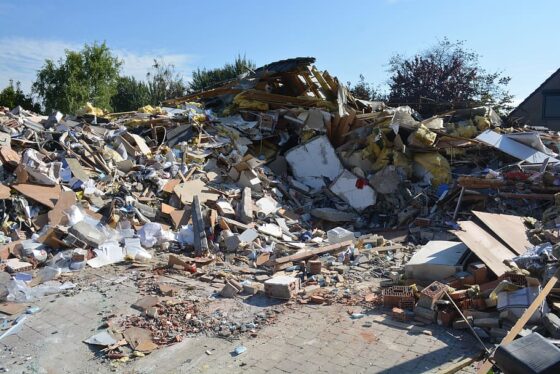Most water heaters are put out somewhere invisible or set up without much.
This leads people to forget about them or take their maintenance for granted.

In this article, we’ll go over water heater explosions and all the gory details surrounding them.
How does a water heater work?
First off, before we dive in, we’ll lay out how water heaters function.
They’re two types of water heaters – gas and electric. While they’re built on slightly different models, the heating process is similar.
Gas water heaters generate heat with burners and are powered by natural gas. At the same time, electric heaters use coils and are powered by electricity.
Can a water heater explode?
For a water heater that’s been overworked and rarely maintained, it’s simply a matter of when.
Water heaters possess the capacity to explode, tearing the house apart. When left unchecked, the explosions cause serious damage to properties and lives.
In fact, according to the insurance institute of business and home safety, heater explosions sit in the top five sources of residential water damage.
This can add up quickly in bills.
So, to prevent things from taking an unfortunate turn in your home, let’s dive into potential causes of water explosion you should be aware of.
What causes a water heater to explode?
If you’ve ever wondered what could cause a water heater to explode, you’re about to find out why.
High Pressure Inside The Water Heater
This is the main cause of water heater explosions. The water heats up, expands, and builds pressure inside the tank.
However, a few factors worsen the effects of pressure;
Usually, as pressure builds up due to heating, a safety feature called the temperature & pressure relief valve helps to release it.
If this feature becomes faulty, the pressure gets too high, causing the pipe to explode.
Another factor that causes pressure build-up is sediment and mineral deposits that harden over time. By hardening, these sediments corrode the inner lining and weaken the walls of the water heater.
Proper maintenance ensures they’re removed and can even double the lifespan of your water heater.
Poor Water Heater Installation
In an attempt to save money, homeowners wrongly take a DIY approach to install heaters in their homes.
This creates room for improper installation, which can attract a host of potential problems down the line – with explosions being the worst.
Gas Leakage
This is a problem unique to gas water heaters. They’re powered by natural gas, and if a gas leaks, it escapes into the home environment.
A tiny electric spark or flame can ignite the gas resulting in a massive explosion.
Danger Signs Your Water Heater Might Explode
- Rotten Egg Smell
The symptoms reveal the culprit. For instance, a rotten egg signals a gas leak. Natural gas has a rotten egg smell to alert homeowners when a possible leak occurs.
- T&P Valve Leakage.
The number one sign that your water heater could explode is if the T&P starts to discharge hot water.
If you notice this, do not ignore it and get it fixed or replaced
Preventive Methods
As the saying goes, “prevention is better than cure” Stopping water heater problems before they happen a good way to protect lives and property.
So, here are a few methods to do that;
Drain & Flush Your Water Heater.
Without routine maintenance, heaters are bound to fail over time.
By draining and flushing your water heater, you eliminate sediments and minerals built up inside the tank.
Ideally, this simple process should be carried out once every year.
Inspect Your T&P Valve
The temperature and pressure relief valve are vital to the water heater system. And it’s usually located at the top side of the water heater.
Sometimes, sediments build up, clog the valve, and prevent it from opening.
Without routine checks, the valve remains closed, allowing pressure to build up inside the tank.
So, how do you perform a routine check?
If your T&P valve has a discharge pipe, place a bucket under it. Then, lift the lever to open the valve for 5 to 10 seconds.
At this point, you should notice water leaving through the discharge pipe into your bucket.
Temperature Check.
Each water heater comes with a thermostat that allows you to adjust temperature settings up to 140°.
And while most people like keeping such high settings, it poses a long-term problem. Over time, it reduces the lifespan of your water, leading to frequent discharge from the T&P valve.
Our recommendation is to keep temperature settings anywhere from 110 – 120°
Gas Leakage Check
Turn off the gas supply immediately if you detect a rotten egg or sulfur smell.
Then, you contact a professional plumber.
Anode Check
The anode rod has become known as the sacrificial rod because it attracts dust and sediments that could otherwise cause potential damage to the tank.
By replacing the anode routinely, you ensure sediments don’t build up and increase the pressure in the water heater.
Install Water Above Floor Level
When possible, water heaters should ideally be installed 18 inches above floor level.
This is simple; various explosive liquids could be kept around water heaters. And if the vapors reach the gas control valve, it could lead to an explosion.

Jay
Jay is a health and wellness enthusiast with expertise in water quality and nutrition. As a knowledgeable advocate for holistic well-being, Jay successfully manages Type 2 Diabetes through informed lifestyle choices. Committed to sharing reliable and authoritative insights, Jay combines firsthand experience with a passion for enhancing health."
